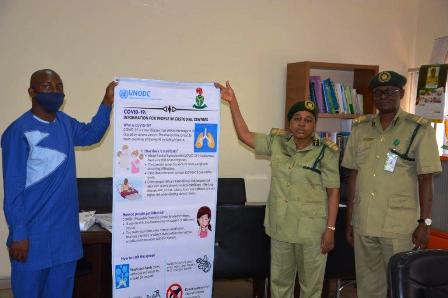Following the spread of COVID-19 in prisons around the world, the United Nations Office for Drugs and Crime (UNODC) has donated information materials providing basic facts about the virus to the Nigerian Correctional Service for distribution to for staff and inmates across the country.
The materials according to a statement by UNODC country office, Abuja, are produced in English, Yoruba, Hausa and Igbo and will be disseminated across the 244 Custodial Centres in Nigeria,
Receiving the materials on behalf of the Nigerian Correctional Service, the Comptroller General, Ja’afaru Ahmed, stated that “this noble donation will assist the Service in its prompt response to curtail and control the spread of COVID-19 and ensure the Service maintains its zero COVID-19 related deaths.

“At this period of health challenge, any effort made to make life easier for others is appreciated,” he said.
Confirmed COVID-19 cases amongst prisoners and/or prison officers have been reported in many countries, including Austria, Belgium, Canada, China, France, Germany, the Islamic Republic of Iran, Italy, the Netherlands, Pakistan, South Korea, Spain, Switzerland, Moldova, South Africa, Turkey, the United Kingdom and the United States.
The number, according to the UNODC statement, is almost certain to increase in the future.
It will be recalled that the Federal Government, on 9 April 2020, announced the early release of 2600 inmates serving sentences for minor offences or whose prison terms were about to expire with a view to reducing overcrowding which has been plaguing Nigeria’s correctional system for decades.
“Recent prison riots across the globe have shown that being infected is not the only COVID-19 related risk prisoners and staff are facing. Misinformation and misconceptions about the virus cause stress that can lead to panic, aggression and eventually violence,” UNODC said.

